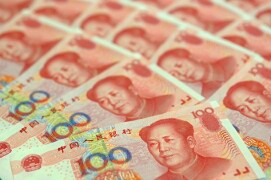The Chinese yuan is weakening against its US counterpart midweek, despite increased state support that should give the currency a boost. The federal government has announced a series of measures aimed at spurring economic growth as the worldâs second-largest economy weathers the global trade storm, something that analysts contend will exacerbate next year.
This week, Beijing announced a round of tax cuts that would be the equivalent of 1% of gross domestic product, or $119 billion. The Peopleâs Bank of China (PBOC) believes that the extent of the federal governmentâs widespread tax cuts will be greater than the ones enacted by President Donald Trump and the Republicans.
Although China is rolling out a plethora of state stimulus measures, like infrastructure spending, Beijing also aims to implement policies that are friendly to the private sector. This could consist of passing labor reforms, promoting innovation, increasing tax deductions, and lowering tax rates.
Some investors feel that these measures may not be enough for either the economy or the yuan.
With economic growth slowing to 6.5% in the third quarter, missing market expectations, it could be a sign of things to come once additional US tariffs go into effect on January 1. Ultimately, China might face a difficult winter with the effects of the trade spat prevalent throughout the country.
Meanwhile, the yuan is projected to weaken further over the next six months, says Goldman Sachs.
According to Timothy Moe, co-head of Goldman’s Asia macro research, the yuan could reach 7.1 against the greenback by the middle of 2019.
It’s probably unlikely to happen before the end of the year because … 7 seems to be the short-term line in the sand … The US is looking at that figure â and probably a bit above â as evidence that might support allegations of currency manipulation.
Both US and Chinese officials are working diligently to get President Trump and President Xi Jinping at the negotiating table to reach a compromise. Beijing has conceded that it is ready to retaliate to tariffs, no matter how exorbitant and extensive they may be. President Trump seems willing to keep applying pressure until he exits the White House until a new trade deal is done.
The USD/CNY currency pair rose 0.08% to 6.944, from an opening of 6.9384, at 16:42 GMT on Wednesday. The EUR/CNY slipped 0.6% to 7.9123, from an opening of 7.9601.
If you have any questions, comments or opinions regarding the Chinese Yuan,
feel free to post them using the commentary form below.



Be First to Comment